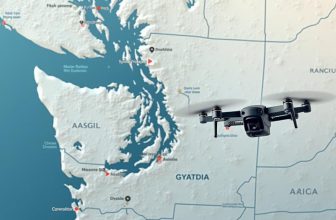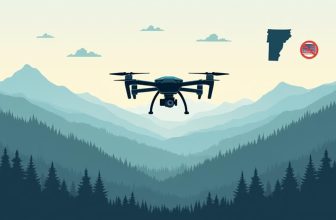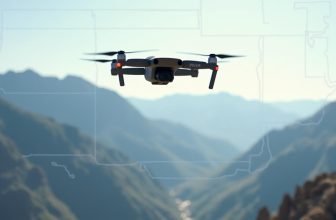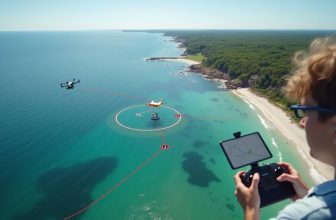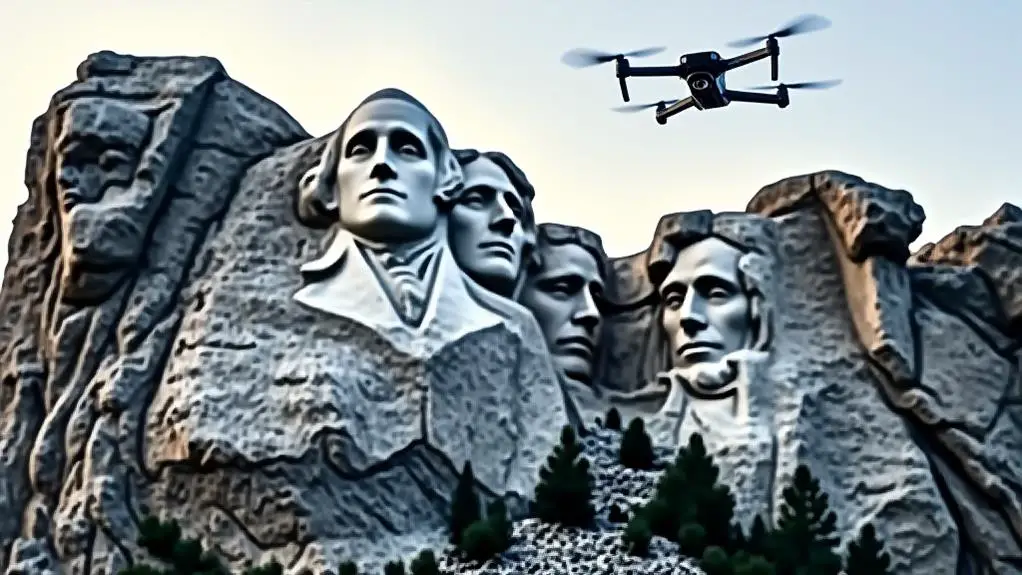
If you're planning to fly a drone in South Dakota, you'll need to know the state's specific regulations to avoid hefty fines and penalties. As a drone operator, you'll be responsible for complying with both Federal Aviation Administration (FAA) guidelines and state laws. But what exactly does this entail? Do you need to register your drone, and if so, how do you go about it? Knowing the ins and outs of South Dakota's drone laws is vital, especially when it comes to airspace and right-of-way rules – an area where many operators unknowingly put themselves at risk.
Contents
Key Takeaways
- Recreational drones in South Dakota must comply with FAA guidelines and state-specific regulations.
- Drones weighing 0.55-55 pounds require FAA registration with a $5 fee.
- Commercial drone operators need a Part 107 remote pilot certificate and thorough Flight Planning strategy.
- Drone operators must yield to manned aircraft and follow airspace and right-of-way rules.
- Violations of South Dakota drone laws can result in fines, imprisonment, or both, with penalties increasing for severe offenses.
Recreational Drone Regulations
Recreational drone operators in South Dakota must comply with the Federal Aviation Administration's (FAA) guidelines and state-specific regulations.
You must register your drone if it weighs between 0.55 and 55 pounds. You'll need to create an account on the FAA's website and pay a registration fee of $5. Once registered, you'll receive a unique identification number that must be displayed on your drone.
You'll also need to follow drone safety tips, such as maintaining a visual line of sight with your drone, flying below 400 feet, and avoiding no-fly zones like national parks and airports.
Additionally, you mustn't fly over people or in areas with temporary flight restrictions.
In South Dakota, you don't need a recreational permit to fly a drone, but you must comply with the FAA's guidelines and any local ordinances.
Some areas, such as state parks, may have specific rules or restrictions on drone use.
Before flying, it's crucial to check with local authorities and familiarize yourself with any regulations that may apply to your location.
Commercial Drone Operations
To operate a drone for commercial purposes in South Dakota, you'll need to comply with the Federal Aviation Administration's (FAA) regulations and obtain the necessary certifications.
This includes obtaining a Part 107 remote pilot certificate, which requires passing a knowledge test and meeting other eligibility requirements.
As a commercial drone operator, you'll also need to develop a thorough Flight Planning strategy to guarantee safe and efficient operations.
This includes evaluating weather conditions, air traffic, and other potential hazards, as well as identifying suitable launch and recovery sites.
Additionally, you'll need to establish procedures for emergency situations, such as system failures or loss of link.
Furthermore, you should consider investing in Insurance Options to protect yourself and your business in the event of an accident or other unforeseen circumstances.
The FAA doesn't require insurance for commercial drone operations, but it's highly recommended to mitigate potential risks and liabilities.
Drone Registration Requirements
Having established the requirements for commercial drone operations in South Dakota, you must also ponder the registration needs for your drone.
According to the Federal Aviation Administration (FAA), drones weighing more than 0.55 pounds and less than 55 pounds must be registered. You'll need to register your drone online through the FAA's website, providing your name, email address, and physical address.
The registration fees structure is a one-time payment of $5, valid for three years. You'll receive a unique registration number, which must be displayed on your drone.
It's crucial to note that registration is mandatory, and failure to comply may result in fines and penalties.
Additionally, you may want to ponder drone insurance options to protect yourself against liability and potential damages. While insurance isn't mandatory, it's highly recommended, especially for commercial drone operators.
Verify you understand the terms and conditions of your insurance policy to guarantee adequate coverage.
Registering your drone and pondering insurance options will help you comply with South Dakota drone laws and minimize potential risks.
Airspace and Right-of-Way Rules
One crucial aspect of South Dakota drone laws is understanding airspace and right-of-way rules.
You must be aware of the different classes of airspace, including Class B, C, D, E, and G airspace. Class B, C, D, and E airspaces are typically found around airports and have specific requirements for drone operation.
Class G airspace has fewer restrictions but still requires you to follow right-of-way rules.
When flying your drone, you must yield to manned aircraft, including airplanes, helicopters, and gliders.
You must also give way to other drones if they're already in the airspace or on a conflicting flight path. This means being aware of air traffic and flight paths in your area, including those of nearby airports or airfields.
It's essential to check the airspace where you plan to fly your drone before taking off.
You can use online tools or mobile apps to determine the type of airspace you're in and any restrictions that apply.
Additionally, you should always follow the FAA's right-of-way rules, which include yielding to aircraft with less maneuverability and those that are already in the airspace.
State Drone-Related Penalties
In South Dakota, failing to follow the established airspace and right-of-way rules can lead to various penalties.
If you're found guilty of violating these rules, you may face fines, imprisonment, or both. According to South Dakota law, you can be fined up to $1,000 and/or imprisoned for up to 30 days for a class 2 misdemeanor, which includes drone misuse fines.
For more severe aviation violations, such as recklessly operating an unmanned vehicle, you can be charged with a class 1 misdemeanor, resulting in fines up to $2,000 and/or imprisonment for up to 1 year.
Additionally, if your drone operation results in bodily injury or property damage, you may face more severe penalties, including felony charges.
It's crucial to familiarize yourself with South Dakota's drone laws and regulations to avoid these penalties.
Before flying your drone, verify you follow all applicable rules and guidelines to minimize the risk of accidents and violations.
You can find detailed information on South Dakota's drone laws and regulations on the state's official website or by contacting the relevant authorities.
Frequently Asked Questions
Can I Fly Drones Over Private Property in South Dakota?
When flying drones over private property in South Dakota, you're dealing with airspace rights and property boundaries. You should obtain permission from landowners and respect local ordinances, ensuring you don't trespass or invade property owners' rights.
Are There Any Age Restrictions for Drone Operators in SD?
You're basically launching a flying robot into the skies, so age restrictions are vital. In South Dakota, you must be at least 13 for recreational drone use, requiring youth supervision and pilot training under 16.
Do I Need Insurance to Operate a Drone in South Dakota?
When operating a drone in South Dakota, you'll need commercial liability insurance if you're using it for business purposes. For recreational flights, you're not mandated to have insurance, but recreational coverage is highly recommended.
Can I Fly Drones Over National Parks in South Dakota?
Navigating drone laws is like charting a course through uncharted waters. When flying over national parks in South Dakota, you must follow National Park Rules and practice Drone Etiquette, ensuring you're aware of airspace restrictions and regulations.
Are There Any Specific Drone Laws for Hunting in SD?
When hunting in South Dakota, you must comply with specific drone laws regarding wildlife management and hunting regulations. You can't use drones to hunt, scout, or locate wildlife, as it's prohibited by the state's hunting laws.
Conclusion
As you launch your drone into South Dakota's sky, the same winds that carry your aircraft also carry the weight of responsibility. Coincidentally, the moment you hit the skies is the same moment you must comply with state and federal regulations. Remember, failing to register your drone or ignoring airspace rules can bring your flight to an abrupt end, along with hefty fines and penalties. Stay informed to keep flying.



